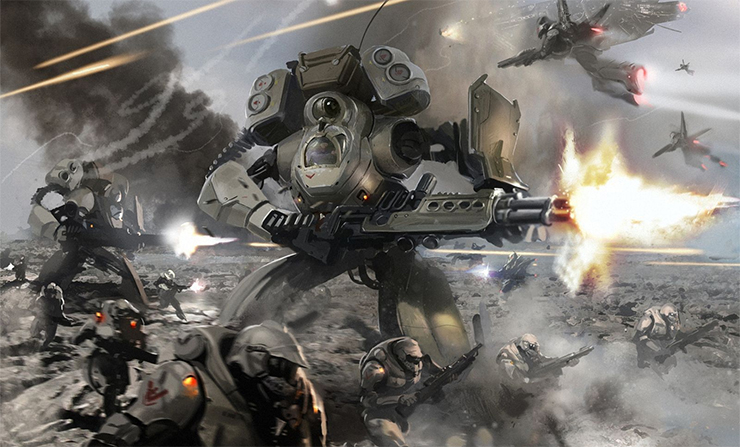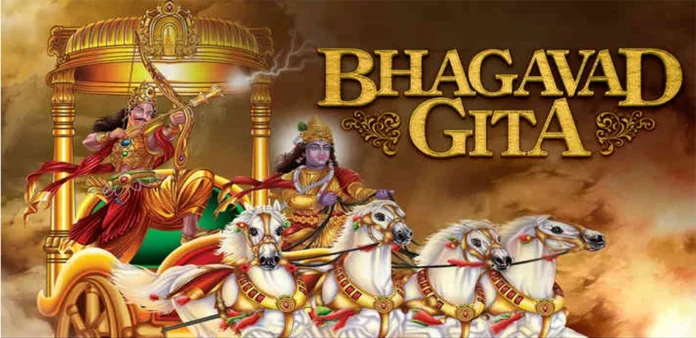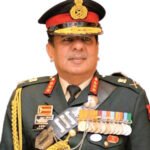“क्लैब्यंमास्मगमःपार्थनैतत्त्वय्युपपद्यते।
क्षुद्रंहृदयदौर्बल्यंत्यक्त्वोत्तिष्ठपरंतप॥”
(Bhagavad Gita 2.3)
“O son of Kunti, that determination which is unbreakable, which is sustained with steadfastness through yoga practice, and thus controls the mind, life, and the acts of the senses, is in the mode of goodness.”
This verse serves as a profound encouragement to Arjuna, urging him not to succumb to weakness, doubt, and dilemma. It emphasises the paramount importance of unwavering determination and disciplined mastery over the mind and senses, qualities that are of utmost significance for military personnel. In the crucible of the battlefield, this verse underscores the necessity for resolute commitment to one’s duty and the capacity to maintain composure and focus even in the most adverse circumstances.
The Bhagavad Gita, consisting of 700 verses, is not merely a spiritual and philosophical treatise but also a reservoir of invaluable leadership insights and a way of life. At its core lies Lord Krishna, the bestower of eternal wisdom upon Arjuna, a Pandava warrior beset by indecision and inner turmoil. Amidst the tumultuous battle of Kurukshetra, an enlightening dialogue transpires between them, culminating in the revered scripture. The verses delve deep into the concepts of duty (dharma), self-realisation, and the paths of knowledge, devotion, and action.
Self-awareness and Purpose
A fundamental lesson imparted by Lord Krishna is the paramount importance of self-awareness and a crystal-clear sense of purpose. Prior to embarking on any meaningful leadership journey, one must possess an intimate understanding of one’s strengths, weaknesses, and core values. Arjuna’s inner turmoil poignantly mirrors the universal human struggle with self-doubt, indecision and confusion. Lord Krishna’s counsel champions leaders to harmonise their actions with their intrinsic purpose, resolutely staying the course despite adversities.
Leading by Example
Lord Krishna’s actions serve as a wellspring of inspiration for his followers, compelling them to offer their very best. Within the realm of leadership, authenticity and the practice of leading from the forefront emerge as pivotal attributes that instil unwavering trust and unswerving loyalty among team members. It underscores the notion that it is not only the possession of power that counts, but the transformative potential it wields. Furthermore, it highlights the vital importance of not merely producing followers but of nurturing them into leaders who emulate the virtues of their leader.
The Art of Decision-Making
In the Bhagavad Gita, Lord Krishna accentuates the gravity of astute decision-making. Leaders frequently encounter intricate dilemmas, and the Gita instructs us to base our decisions upon ethics and values. Lord Krishna’s counsel to Arjuna, urging him to perform his duty or dharma, resonates with the imperative for leaders to make choices that harmonise with their fundamental principles and contribute to the greater good.
Managing Emotions
Arjuna’s emotional turmoil on the battlefield is a profoundly relatable human experience. Lord Krishna imparts the wisdom that adeptly managing one’s emotions stands as an indispensable component of effective leadership. Leaders are obliged to maintain their composure under pressure, make rational decisions, and exhibit unwavering empathy towards their team members. The possession of emotional intelligence emerges as an essential trait, facilitating the establishment of robust relationships and the capacity to lead with empathy.
Delegation and Trust
Lord Krishna enjoins Arjuna to place trust in his capabilities and those of his comrades. Effective leaders are those who empower their team members, judiciously delegate responsibilities, and confidently repose trust in their competence. The act of trusting others fosters a spirit of collaboration and empowers leaders with the liberty to concentrate on strategic cogitation and decision-making.
Resilience and Perseverance
The Bhagavad Gita passionately underscores the primacy of resilience and tenacity when confronting adversity. Leaders frequently encounter setbacks and tribulations. Lord Krishna’s teachings serve as a clarion call to nurture unwavering determination and grit while pursuing one’s goals. By doing so, leaders find themselves equipped to inspire their teams to exhibit similar resoluteness, even in the face of adverse circumstances.

Team Leadership
Arguably one of the most profound leadership lessons gleaned from Lord Krishna’s teachings revolves around the concept of team leadership. He passionately extols the virtues of selfless service and a genuine concern for the well-being of others. Leaders who accord precedence to the needs and welfare of their team members succeed in cultivating a nurturing and motivating workplace environment.
Thought Leadership and Vision
In the backdrop of the battle of Kurukshetra, Lord Krishna brilliantly exhibits his visionary acumen, foresight, and creativity in enlightening Arjuna about the impending course of events and his pivotal role therein. This encapsulates the essence of thought leadership, which delineates the distinction between the two opposing sides. Succinctly, a thought leader represents the convergence of an exceptional thinker, replete with strategic, insightful, and creative attributes, and an extraordinary leader, distinguished by a daring, inspiring, and empowering leadership style. This is a facet of leadership that military institutions must earnestly integrate into their training programmes.
Moral Leadership
Lord Krishna, through his verses, repeatedly underscores the supremacy of the spiritual and moral self over the transient and material self. His teachings serve as a pathway to ultimate liberation and self-realisation, and a guide not only for warriors but for all seekers of truth.
In the contemporary politico-military landscape, it becomes increasingly imperative for military leaders to not merely possess but to consistently exhibit an unassailable moral compass, firmly anchored in righteousness. The preservation of the sanctity of the uniform and the dignity of one’s rank and appointment must never waver. One’s focus and moral intent must remain steadfastly oriented towards the organisation and the men and women under one’s command.
“कर्मण्येवाधिकारस्तेमाफलेषुकदाचन।
माकर्मफलहेतुर्भूर्मातेसङ्गोऽस्त्वकर्मणि॥”
(Bhagavad Gita Chapter 2, Verse 47)
“You have the right to perform your prescribed duties, but you are not entitled to the fruits of your actions.”
Takeaways
The Bhagavad Gita stands as an eternal wellspring of wisdom that reverberates with profound relevance for contemporary leadership. Lord Krishna’s teachings serve as an inspirational compass, urging leaders to cultivate self-awareness, uphold ethics, embrace empathy, and nurture resilience. By authentically leading with a sense of purpose, making sagacious decisions, and dedicatedly serving their teams, leaders possess the transformative potential to engender a positive influence over their teammates, akin to Lord Krishna, who illuminated Arjuna’s path. As this verse brilliantly encapsulates the essence of a warrior’s duty:
“I am a Warrior; defending my Nation is my Dharma,
I will train my mind, body and spirit to fight,
Excel in all devices and weapons of war—present and future,
Always protect the weak,
Be truthful and forthright,
Be humane, cultured and compassionate,
Fight and embrace the consequences willingly,
God, give me strength that I ask nothing of you”.
—The Bhagavad Gita
The author is a PVSM, AVSM, VSM has had an illustrious career spanning nearly four decades. A distinguished Armoured Corps officer, he has served in various prestigious staff and command appointments including Commander Independent Armoured Brigade, ADG PP, GOC Armoured Division and GOC Strike 1. The officer retired as DG Mechanised Forces in December 2017 during which he was the architect to initiate process for reintroduction of Light Tank and Chairman on the study on C5ISR for Indian Army. Subsequently he was Consultant MoD/OFB from 2018 to 2020. The Officer is a reputed defence analyst, a motivational speaker and prolific writer on matters of military, defence technology and national security.The views expressed are personal and do not necessarily carry the views of Raksha Anirveda.
The author, a PVSM, AVSM, VSM has had an illustrious career spanning nearly four decades. A distinguished Armoured Corps officer, he has served in various prestigious staff and command appointments including Commander Independent Armoured Brigade, ADG PP, GOC Armoured Division and GOC Strike 1. The officer retired as DG Mechanised Forces in December 2017 during which he was the architect to initiate process for reintroduction of Light Tank and Chairman on the study on C5ISR for Indian Army. Subsequently he was Consultant MoD/OFB from 2018 to 2020. He is also a reputed defence analyst, a motivational speaker and prolific writer on matters of military, defence technology and national security. The views expressed are personal and do not necessarily carry the views of Raksha Anirveda






